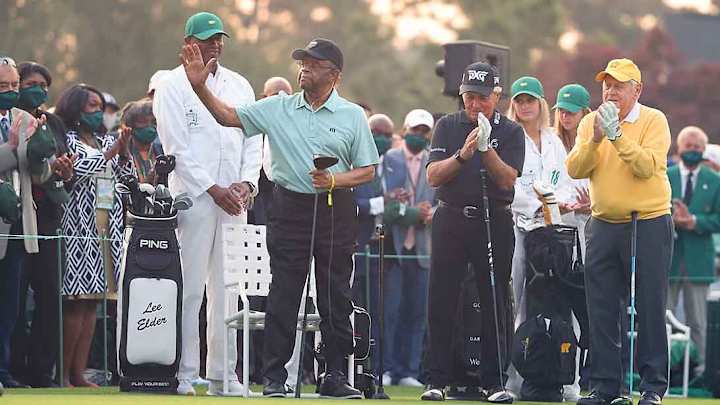Uncommon Grace Proves to be Lee Elder's Lasting Legacy

Lee Elder, who in 1975 was the first black player to compete in the Masters, died Sunday night. He was 87.
Augusta National was Elder’s touchstone, not simply because he made significant history there but for the uncommon grace with which he carried himself each time he stepped onto the grounds and every time he was asked to talk about it.
In Elder’s mind and in his words, Augusta was never about him. It was for Ted Rhodes, Pete Brown, Charlie Sifford and all the other African-American professional golfers who laid down a path paved with abuse and indignities, as well as boundless courage and unending determination.
Elder was the beneficiary of the struggles of the pioneers who came before him. But he paid his own dues and survived his own difficult road. At age 9, in his hometown of Dallas, Texas, Elder started to caddie at Tennison Park Golf Course to help his family make ends meet. He also began to play golf and by the time he was a teenager, he was good enough to attract the attention of legendary gambler and hustler Alvin C. Thomas, who was known as Titanic Thompson.
They traveled the country together and it was standard fare that Thompson would find a mark and beat him the first day and then give the unsuspecting pigeon the chance to break even the next day by playing against Elder, who posed as Titanic’s caddie.
In 1966, Elder won 21 of 23 tournaments he entered, mostly miniscule purse events on the United Golf Association tour, a professional circuit for black golfers. He accumulated enough money to try to qualify for the PGA Tour. Elder said at the time, he was required to produce a bank statement that showed he had at least $6,500 in his account before he was allowed to apply for the Tour’s Qualifying Tournament.
Elder qualified easily for the PGA Tour and started his career in 1967. Two years later, he was in a three-way playoff for the American Golf Classic at Firestone Country Club in Akron, Ohio. His opponents were Jack Nicklaus and Frank Beard, who fell out after the first playoff hole. Elder and Nicklaus went four more holes before Nicklaus prevailed.
At the 1974 Monsanto Open in Pensacola, Fla., Elder made birdies on three of his last four holes to get into a playoff with Peter Oosterhuis. Elder’s 18-foot birdie putt on the fourth extra hole gave him his first PGA Tour victory but more importantly, he would be playing in the Masters the following spring.
Elder received death threats leading up to April 1975 and he rented two houses in Augusta so that no one would know exactly where to find him. But he refused to dwell on that.
"I'll never forget the ride down Magnolia Lane," Elder told Pete McDaniel of Golf Digest. "Some of the players had told me how it felt, but I wasn't prepared for it. When we turned down that cobblestone road, I started to shake. It changed my life."
Despite the level of hate and the threats of bodily harm against him, Elder always chose to see the roses and not the thorns.
“What I remember so much about my first visit here was the fact that every tee and every green that I walked on, I got tremendous ovations,” he said in April at the Masters. “I think when you receive something like that, it helps you to settle down, because I'll tell you, I was so nervous as we began play that it took me a few holes to kind of calm down.
“I think that on several occasions, as I thought about where I was and where I had come from, it was certainly a reminder of, ‘Hey, you've worked for this, you have now achieved it. Just relax and enjoy the moment. Your life is not going to depend on how well you play. You don't have to be worrying about carrying anyone on your shoulder. You're there just on your own. This was a goal that you had set for yourself. You have achieved it, so now relax and play some golf and just enjoy the moment.’”
Elder also made history for becoming the first black player to compete for the U.S. in the 1979 Ryder Cup. He wound up with four victories on the PGA Tour and eight wins after he turned 50 on the PGA Tour Champions.
He served on the board of Goodwill and raised money for the United Negro College Fund. And in 2020, Augusta National created scholarships and funded the beginning of a women’s golf program in Elder’s name at Paine College, a Historically Black College and University in Augusta.
At the same time, the club announced that Elder would be an honorary starter for the 2021 Masters, joining Nicklaus and Gary Player. Because of his poor health, Elder was unable to hit a shot but was present on the first tee for the ceremony.
Afterward, Elder said, “For me and my family, I think it was one of the most emotional experiences that I have ever witnessed or been involved in. It is certainly something that I will cherish for the rest of my life.”
We didn’t realize the time would be that short.
More Lee Elder Coverage, from the Sports Illustrated archive:
- The Courage of Lee Elder (SI Vault)
- Elder Reflects on Legacy Ahead of 2021 Masters, by Michael Rosenberg
- Lee Elder, First Black Man to Play in the Masters, Dies at 87
